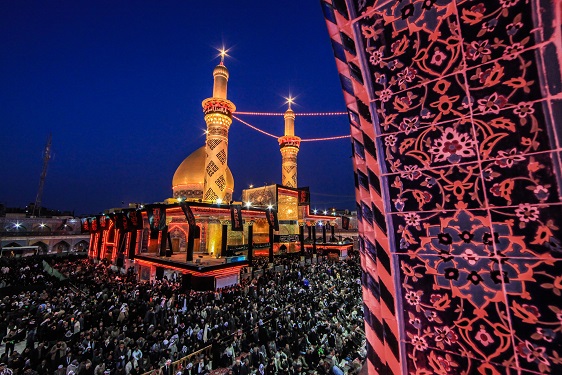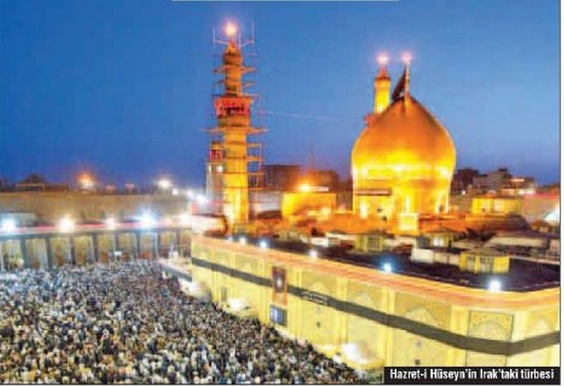
THE TRUTH OF KARBALA
The Karbala Incident, in which Husayn ibn Ali was martyred, is a tragic event that pains the hearts of all Muslims. As the poet said, "Every place is Karbala for us; every day is Ashura for us." However, it is also true that this tragedy has been a cause of stirring divisions among people...
After the death of The Prophet Muhammad (peace be upon him), his Companions (Sahaba) elected Abu Bakr as the caliph. He then appointed Umar as his successor. Later, Uthman was elected, followed by Ali. When Ali was killed by the Kharijites who had left his army, allegiance was given to his son Hasan. Hasan abdicated the caliphate in favor of Muawiyah ibn Abu Sufyan after about six months.
We Will Correct Him
Muawiyah ruled as caliph for about 19 years. In 679, Mughira ibn Shu'ba, one of the prominent Companions, came to Damascus and said, "O Commander of the Faithful! You saw the chaos and bloodshed that occurred after Uthman. Appoint your son as your successor! He will be a refuge for people. You will prevent strife." The caliph responded, "My son is young and inexperienced. I don't think he will be a good caliph." However, Mughira said, "If necessary, we will correct him," and persuaded the caliph.
He also advised Yazid to correct his behavior. The caliph consulted with governors and prominent Companions during that year's Hajj. Everyone accepted this appointment. Only Husayn ibn Ali and Abdullah ibn Zubayr said, "We will not pledge allegiance, but we will not oppose either." According to their ijtihad (legal interpretation), as long as there were Companions, no one else could become caliph. Scholars must follow their ijtihad when they make judgments.
Muawiyah, after returning to Damascus, gave advice to his son Yazid, whom he had declared as his successor, and soon passed away. The transfer of rulership from father to son is not contrary to Islam. As narrated in the Quran, Solomon succeeded his father David as king.
Don't Go, My Brother!
When Yazid became caliph, he appointed Ubaydullah ibn Ziyad, the conqueror of Turkestan, as governor at the request of the people of Kufa. When Ibn Ziyad arrived in Kufa, he found the city in chaos. He called for the people's obedience. Hundreds of rebels then declared Husayn as caliph and besieged the governor's house. The governor dispersed them. Meanwhile, Husayn set out from Mecca upon the invitation of the Kufans. Abdullah ibn Abbas advised him not to go, reminding him of how the Iraqis had betrayed his father, but he did not listen, citing his promise.
Ibn Ziyad sent Umar, the son of Sa'd ibn Abi Waqqas, who was on his way to take over as governor of Rey with four thousand men, to intercept Husayn. Umar reluctantly accepted. They met at Karbala in southwestern Iraq.
Husayn agreed to return. Ibn Ziyad, in a manner more royalist than the king, told Husayn to pledge allegiance to the caliph before leaving. When he did not pledge allegiance, Umar advanced his army. On the 10th day of Muharram in the year 60 (680 CE), Husayn was martyred along with seventy of his followers. The Kufans did not help him; in fact, his killers were Kufans. Ashura means the tenth day.

He Gives Dominion to Whom He Wills
The women in the caravan and Husayn's son Zayn al-Abidin were taken to Damascus. When the caliph heard this news, he was distressed and prayed for mercy upon Husayn. He cursed Ibn Ziyad, saying, "He made the Hashimites enemies to me. If Husayn had come to me, I would have accepted whatever he wanted. Do you know why he died? He said, 'My father is better than his father; my mother is better than his mother; my grandfather is better than his grandfather. Therefore, I am better than him. The caliphate is my right.' It's true. His father is better than my father; his mother is better than my mother. As for his grandfather, no one who believes in Allah and the Last Day sees anyone equal to the Messenger of Allah. But Husayn acted on his own ijtihad and did not recall the verse (Surah Al-Imran: 26) which means 'O Allah, Lord of all dominion! You give dominion to whom You will.'"
After treating the remaining members of the caravan with hospitality, he sent them back to Medina. Husayn's daughter Sukayna used to say, "I have not seen a more gracious enemy than Yazid." Yazid could have killed Zayn al-Abidin and ended Husayn's lineage if he had wanted to. His fault was not considering Husayn's honor and failing to foresee and prevent the excesses of his governors.
No Permission for Cursing!
Yazid, one of the most unfortunate figures in history, has been subjected to exaggerated accusations and even insults due to this incident. The name Yazid, which is a beautiful Arabic name meaning "increase" and was borne by many Companions, has become a term of insult. However, prominent scholars like Layth ibn Sa'd considered Yazid just and called him the Commander of the Faithful. Ahmad ibn Hanbal accepted Yazid as a scholar from the generation of the Tabi'un who had learned from the Companions and regarded his words as authoritative. Many scholars, including Imam Ghazali, did not consider cursing Yazid permissible. Even those who did not approve of Yazid reached this conclusion not because of Karbala, but because of the disproportionate measures taken during the rebellion of the people of Medina.
The Prophet said, "The first army to campaign against Constantinople is forgiven." Yazid was the commander of this army. Abu Ayyub al-Ansari, one of Ali's governors, participated in this campaign under Yazid's command. The name Bayezid was common among Muslims, including Turks. Bayezid (Abu Yazid) means the father of Yazid and refers to Muawiyah.
After the Abbasids took power and massacred the Umayyad family, historians inflated the Umayyads' mistakes to please the new rulers; they even fabricated hadiths against them. Due to their temporal and geographical proximity, Ottoman historians were also influenced by these accounts. However, the Umayyad period was a golden age of Islamic civilization.
Ashura Demonstrations
So, when did mourning and wailing on Ashura day start? In 67 AH, Mukhtar al-Thaqafi, who rebelled against the Umayyads, initiated this as a trick to rally the people of Kufa for war. It symbolized the regret of those who abandoned Husayn and turned back. Mukhtar was killed in this rebellion, but the propaganda tool he started spread among some as a form of worship.
The Karbala Incident, in which Husayn ibn Ali was martyred, is a tragic event that pains the hearts of all Muslims. As the poet said, "Every place is Karbala for us; every day is Ashura for us." However, it is also true that this tragedy has been a cause of stirring divisions among people. After this date, a sect emerged among Muslims who believed that the caliphate rightfully belonged to Ali and that the others usurped it and were therefore disbelievers. Consequently, they did not accept hadiths narrated by anyone outside Ali's family. This sect is called the Shia. Today, the Jafaris in Iran and the Zaydis in Yemen represent this sect.
Over time, extremist factions also emerged within the Shia, who believed in Ali's prophethood, that the Quran was altered, and even that Allah appeared in the form of Ali. While Shi'ism had a limited following, it spread widely in Iran and southern Iraq from the time of Shah Ismail; after Shah Abbas massacred all the Sunnis, it became the official sect of Iran.
Önceki Yazılar
-
“FASTING WAS MADE OBLIGATORY ALSO UPON THOSE BEFORE YOU”25.02.2026
-
WHAT WAS THE LAW OF THE OTTOMAN EMPIRE?18.02.2026
-
WOMAN IN THE EASTERN WORLD11.02.2026
-
THE OTTOMAN DYNASTY OWES ITS LIFE TO A WOMAN4.02.2026
-
THE WATER OF IMMORTALITY IN THE “LAND OF DARKNESS”28.01.2026
-
THE WORLD LEARNED WHAT FORBEARANCE IS FROM SULTAN MEHMED II21.01.2026
-
THE RUSH FOR GOLD14.01.2026
-
TRACES OF ISLAM IN CONSTANTINOPOLIS7.01.2026
-
WHO CAN FORGIVE THE KILLER?31.12.2025
-
WHEN WAS PROPHET ISA (JESUS) BORN?24.12.2025